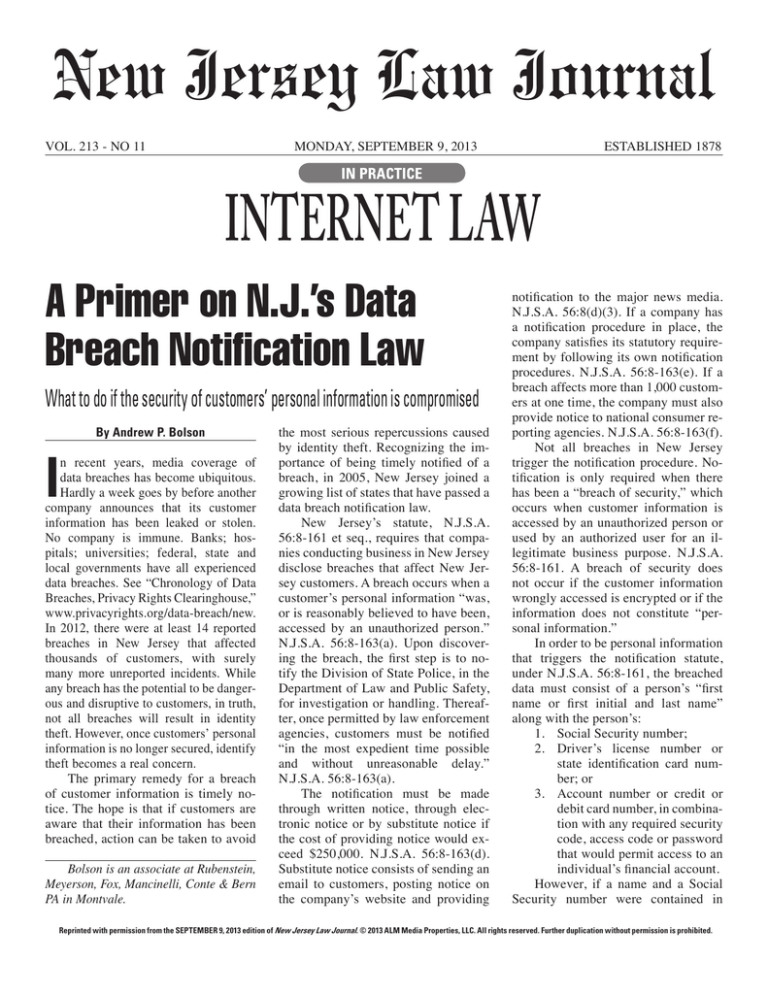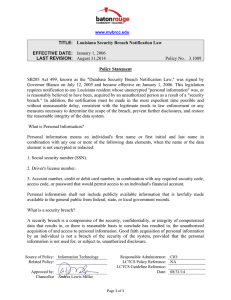
New Jersey Law Journal
VOL. 213 - NO 11
MONDAY, SEPTEMBER 9, 2013
ESTABLISHED 1878
INTERNET LAW
A Primer on N.J.’s Data
Breach Notification Law
What to do if the security of customers’ personal information is compromised
By Andrew P. Bolson
I
n recent years, media coverage of
data breaches has become ubiquitous.
Hardly a week goes by before another
company announces that its customer
information has been leaked or stolen.
No company is immune. Banks; hospitals; universities; federal, state and
local governments have all experienced
data breaches. See “Chronology of Data
Breaches, Privacy Rights Clearinghouse,”
www.privacyrights.org/data-breach/new.
In 2012, there were at least 14 reported
breaches in New Jersey that affected
thousands of customers, with surely
many more unreported incidents. While
any breach has the potential to be dangerous and disruptive to customers, in truth,
not all breaches will result in identity
theft. However, once customers’ personal
information is no longer secured, identify
theft becomes a real concern.
The primary remedy for a breach
of customer information is timely notice. The hope is that if customers are
aware that their information has been
breached, action can be taken to avoid
Bolson is an associate at Rubenstein,
Meyerson, Fox, Mancinelli, Conte & Bern
PA in Montvale.
the most serious repercussions caused
by identity theft. Recognizing the importance of being timely notified of a
breach, in 2005, New Jersey joined a
growing list of states that have passed a
data breach notification law.
New Jersey’s statute, N.J.S.A.
56:8-161 et seq., requires that companies conducting business in New Jersey
disclose breaches that affect New Jersey customers. A breach occurs when a
customer’s personal information “was,
or is reasonably believed to have been,
accessed by an unauthorized person.”
N.J.S.A. 56:8-163(a). Upon discovering the breach, the first step is to notify the Division of State Police, in the
Department of Law and Public Safety,
for investigation or handling. Thereafter, once permitted by law enforcement
agencies, customers must be notified
“in the most expedient time possible
and without unreasonable delay.”
N.J.S.A. 56:8-163(a).
The notification must be made
through written notice, through electronic notice or by substitute notice if
the cost of providing notice would exceed $250,000. N.J.S.A. 56:8-163(d).
Substitute notice consists of sending an
email to customers, posting notice on
the company’s website and providing
notification to the major news media.
N.J.S.A. 56:8(d)(3). If a company has
a notification procedure in place, the
company satisfies its statutory requirement by following its own notification
procedures. N.J.S.A. 56:8-163(e). If a
breach affects more than 1,000 customers at one time, the company must also
provide notice to national consumer reporting agencies. N.J.S.A. 56:8-163(f).
Not all breaches in New Jersey
trigger the notification procedure. Notification is only required when there
has been a “breach of security,” which
occurs when customer information is
accessed by an unauthorized person or
used by an authorized user for an illegitimate business purpose. N.J.S.A.
56:8-161. A breach of security does
not occur if the customer information
wrongly accessed is encrypted or if the
information does not constitute “personal information.”
In order to be personal information
that triggers the notification statute,
under N.J.S.A. 56:8-161, the breached
data must consist of a person’s “first
name or first initial and last name”
along with the person’s:
1. Social Security number;
2. Driver’s license number or
state identification card number; or
3. Account number or credit or
debit card number, in combination with any required security
code, access code or password
that would permit access to an
individual’s financial account.
However, if a name and a Social
Security number were contained in
Reprinted with permission from the SEPTEMBER 9, 2013 edition of New Jersey Law Journal. © 2013 ALM Media Properties, LLC. All rights reserved. Further duplication without permission is prohibited.
213 N.J.L.J. 882
NEW JERSEY LAW JOURNAL, SEPTEMBER 9, 2013
separately breached data sets, the information would still be personal information if the data can be linked together.
Before rushing to notify customers,
companies must understand whether a
breach of security warranting notification has occurred.
When a company does discover a
breach of security requiring notification, it should immediately implement
its own procedures or follow the statutory guidelines. “Willfully, knowingly
or recklessly” violating the data breach
notification law is an unlawful practice
and a violation of New Jersey’s Consumer Fraud Act (CFA). N.J.S.A. 56:8166. The CFA empowers the New Jersey
attorney general to investigate breaches
and to impose penalties. N.J.S.A. 56:83; N.J.S.A. 56:8-3.1. In addition, the
CFA allows for a private right of action
for those persons who can establish they
have experienced an ascertainable loss.
N.J.S.A. 56:8-19. Thus far, in New Jersey, plaintiffs, in the few reported data
breach cases, have been unsuccessful at
establishing their damages.
In Holmes v. Countrywide Financial
Corp., No. 5:08-CV-00205-R, slip op. at
2 (W.D. Ky. July 12, 2012), Matthew
and Danielle Holmes, two New Jersey
residents, were among some 2.5 million
persons who were impacted by a security breach at Countrywide. Concerned
that their stolen information was the
reason they were turned down for a car
loan, the Holmes purchased credit monitoring for $14.95 a month. In January
2009, the Holmes instituted a class-action lawsuit against Countrywide. While
the Holmes’ complaint was joined with
similar lawsuits and heard by the federal
district court in the Western District of
Kentucky, the Kentucky court applied
New Jersey law to analyze their claims.
Specifically, the Holmes court examined
whether charges for credit monitoring
created a sufficient ascertainable loss
for purposes of the CFA.
The court ultimately found that
costs for credit monitoring are not recognizable damages because “[l]itigants
under the state’s laws may not recover
for future harm where an injury has not
materialized.” Similarly, in the other
New Jersey district court cases that
have examined the question of credit
monitoring — namely, Reilly v. Ceridian, 664 F.3d 38, 46 (3d Cir. 2011), and
Giordano v. Wachovia Sec., No. 06-476
(JBS), 2006 U.S. Dist. LEXIS 52266,
at *12 (D. N.J. July 31, 2006) — the
courts have found that fees associated
with credit monitoring do not amount to
an ascertainable loss for the purposes of
a consumer fraud violation.
Despite plaintiffs’ difficulty in
proving an ascertainable loss, New Jersey businesses should not ignore their
responsibilities under the state’s data
breach notification law. By providing
timely notification, companies are effectively immunized from any further
liability under the CFA and from the
state attorney general’s office. For this
reason, the mere threat of a regulatory
investigation and the possibility that a
plaintiff eventually might succeed in
proving an ascertainable loss, or establishing another viable cause of action
under an alternate theory, should be sufficient incentive for a company to fol-
2
low the law and provide the required
notification.
Still, the cost of notification will
likely cause some companies to try
and avoid their regulatory responsibilities. This is likely especially true
of small businesses who may not have
the resources to deal with a large-scale
breach. Companies can minimize their
costs through purchasing insurance
products specifically designed for data
breaches. These insurance products provide peace of mind to companies who
regularly deal with personal information. Depending on a particular policy
and provider, insurance may pay for the
cost of defending lawsuits, for the costs
of responding to any regulatory investigations, for the cost of the notification itself and for the costs of an array
of other expenses that may arise. Since
commercial insurance policies differ
greatly and are often negotiated, companies must determine their needs before
deciding which policy to consider.
For varying reasons, companies
now hold vast amounts of information about their customers. Unfortunately, once customers’ information is
breached, it is difficult for a company to
retrieve and secure what has been lost.
Recognizing the reality of data breaches
in our modern age, the New Jersey legislature has instituted a statutory scheme
to prevent the greatest threat caused by
data breaches, namely, identity theft.
Companies of all shapes and sizes doing business in this state must be aware
of New Jersey’s data breach notification
law, and be ready to comply with its requirements if and when breached. ■


